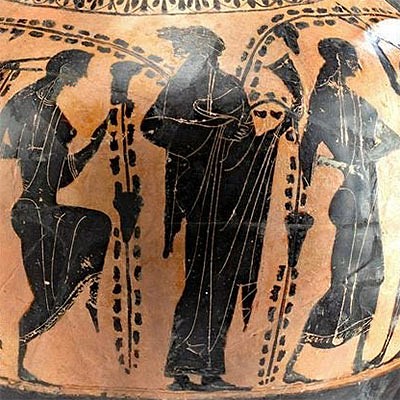Villanovan Late Geometric Copper Horse Bit w/ Horses
Lot 37
About Seller
Artemis Gallery
686 S Taylor Ave, Ste 106
Louisville, CO 80027
United States
Selling antiquities, ancient and ethnographic art online since 1993, Artemis Gallery specializes in Classical Antiquities (Egyptian, Greek, Roman, Near Eastern), Asian, Pre-Columbian, African / Tribal / Oceanographic art. Our extensive inventory includes pottery, stone, metal, wood, glass and textil...Read more
Categories
Estimate:
$7,000 - $10,000
Absentee vs Live bid
Two ways to bid:
- Leave a max absentee bid and the platform will bid on your behalf up to your maximum bid during the live auction.
- Bid live during the auction and your bids will be submitted real-time to the auctioneer.
Bid Increments
| Price | Bid Increment |
|---|---|
| $0 | $25 |
| $300 | $50 |
| $1,000 | $100 |
| $2,000 | $250 |
| $5,000 | $500 |
| $10,000 | $1,000 |
| $20,000 | $2,500 |
| $50,000 | $5,000 |
| $100,000 | $10,000 |
| $200,000 | $20,000 |
About Auction
By Artemis Gallery
Jun 10, 2021
Set Reminder
2021-06-10 10:00:00
2021-06-10 10:00:00
America/New_York
Bidsquare
Bidsquare : Exceptional Antiquities | Asian | Ethnographic
https://www.bidsquare.com/auctions/artemis-gallery/exceptional-antiquities-asian-ethnographic-7012
Museum-worthy examples of Egyptian, Greek, Roman, Viking, Near Eastern, Far East / Asian, Pre-Columbian, African / Tribal, Oceanic, Native American, Spanish Colonial, Russian, Fossils, Ancient Jewelry, Fine Art, so much more! Artemis Gallery info@artemisgallery.com
Museum-worthy examples of Egyptian, Greek, Roman, Viking, Near Eastern, Far East / Asian, Pre-Columbian, African / Tribal, Oceanic, Native American, Spanish Colonial, Russian, Fossils, Ancient Jewelry, Fine Art, so much more! Artemis Gallery info@artemisgallery.com
- Lot Description
Ancient Europe, Northern Italy, Villanovan culture, late Geometric Period, ca. 725 to 700 BCE. A fabulous bronze horse bit comprised of two lengths of copper-silver alloy (20% silver) rods conjoined in the center with fused loops, and with reign rings hanging in the exterior loops. Both cheek pieces are in the form of a standing horse with Geometric characteristics such has a crested mane, a cylindrical snout with a flattened end, bulging eyes, and high-pointed ears, all atop a pair of ringed feet with a sinuous tail on the verso. Atop the hind quarters of the larger horses are smaller colts with nearly identical characteristics as the larger animals. Fine layers of green, brown, and russet patina have formed across the composition, and the original golden-brown bronze color is visible in some abraded areas. Size: 8.25" W x 3.125" H (21 cm x 7.9 cm); 3.7" H (9.4 cm) on included custom stand; quality of silver in copper-silver alloy: 20%.
For a similar example, please see The Metropolitan Museum of Art, accession number 1977.187.6
Another similar example hammered for $17,625 at Christie's, New York "Antiquities" auction (sale 9666, June 8, 2001, lot 23)
Provenance: East Coast, USA collection, acquired in 2017; ex-Christie's, New York "Antiquities" auction (sale 3798, December 9, 2015, lot 40 [unsold]); ex-Vincent Carrozza collection, Texas, USA, acquired in 1981 from Merril C. Rueppel, Needham, Massachusetts, USA; ex-Dr. Elie Borowski collection, Switzerland, Israel, and Toronto, Ontario, Canada, acquired between 1968 and 1981
All items legal to buy/sell under U.S. Statute covering cultural patrimony Code 2600, CHAPTER 14, and are guaranteed to be as described or your money back.
A Certificate of Authenticity will accompany all winning bids.
We ship worldwide and handle all shipping in-house for your convenience.
#146821Repairs to one outer ring, head of one horse, and tails of both horses, with light resurfacing and adhesive residue along break lines. Loss to ear of one horse, with minor nicks and abrasions to all horses and bit rods, and light encrustations within some recessed areas. Light earthen deposits as well as great green, brown, and russet patina throughout.Condition
- Shipping Info
-
All shipping is handled in-house for your convenience. Your invoice from Artemis Gallery will include shipping calculation instructions. If in doubt, please inquire BEFORE bidding for estimated shipping costs for individual items.
-
- Buyer's Premium



 EUR
EUR CAD
CAD AUD
AUD GBP
GBP MXN
MXN HKD
HKD CNY
CNY MYR
MYR SEK
SEK SGD
SGD CHF
CHF THB
THB














